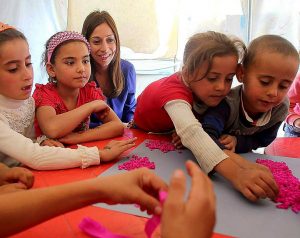Education
INTRODUCTION
At the beginning of the new millennium (the year 2000), the international community made an engagement to achieve universal primary education for all boys and girls around the world. In 2015 (15 years later), we find huge gaps between these engagements and the reality.
58 million children across the world failed to have access to schools, particularly in sub-Saharan Africa and south Asia. Millions more failed to graduate, or failed to learn what they needed to participate in society meaningfully.
 It is observed that according to the Universal Declaration on Human Rights (UDHR), education is inalienable right of every child. Governments must discharge their responsibility as guarantors and regulators of education as a fundamental human right and as a public cause. The provision of basic education, free of cost, is not only a core obligation of states but also a moral imperative.
It is observed that according to the Universal Declaration on Human Rights (UDHR), education is inalienable right of every child. Governments must discharge their responsibility as guarantors and regulators of education as a fundamental human right and as a public cause. The provision of basic education, free of cost, is not only a core obligation of states but also a moral imperative.
The millennium development goals (MDGs) expired in 2015, replaced by the sustainable development goals (SDGs) to pursue a similar mission. Thus, SDGs which is considered as the 2030 Agenda is aimed at achieving better results.
MUNED PERSPECTIVES ABOUT EDUCATION
MUNED being an education and development network cannot overemphasized the importance of education to both personal human development and societal development. Education being the process of facilitating learning, or the acquisition of knowledge, skills, values, beliefs, and habits is one of the factors that foster personal human development as well as the societal development. There is no one individual in the world who will perform very well without education. Despite this fact, MUNED observed that Third-World Countries particular African countries still have poor or weak educational systems particularly lack of infrastructures, teaching tools like computers, projectors, etc, as well as the skillful resource persons (lecturers, teachers, etc). This cause many rich people in the South (South America, Africa) and in the East (Asia) to continually send their children to the North (North America and Europe) to acquire standard education. This is an old age practice that date back to the 19th century and continues to the 21st century. This is an indicator that the educational systems in the countries of the South (South America and Africa) as well as the East (Asia) still has to be improved upon. Regardless of the importance of education to societal development as well as personal human development, many African governments and people are still to embrace the values of education and act as the guarantors and regulators as well as the providers of quality education to children. Many African children still do not have access to education.  This matter is an international matter that has been discussed at international fora and has been adopted by United Nations as Sustainable Development Goal No.4 “Quality Education”. Thus, it is the responsibility of MUNED as an education and development network to emphasize the importance of education as a catalyst of personal human development and societal development. In some African communities like the case of M’muock (Fosimondi) community in the South West Region of Cameroon, we still have children who do not even start elementary education (primary education) either because of the lack of sponsors or lack of educators who can advocate for their right to education. This tells us how a lot is yet to be done in Africa regarding education.
This matter is an international matter that has been discussed at international fora and has been adopted by United Nations as Sustainable Development Goal No.4 “Quality Education”. Thus, it is the responsibility of MUNED as an education and development network to emphasize the importance of education as a catalyst of personal human development and societal development. In some African communities like the case of M’muock (Fosimondi) community in the South West Region of Cameroon, we still have children who do not even start elementary education (primary education) either because of the lack of sponsors or lack of educators who can advocate for their right to education. This tells us how a lot is yet to be done in Africa regarding education.
THE INTERNATIONAL TREATIES ON THE RIGHT TO EDUCATION
The right to education is guaranteed by International human rights law. The Universal Declaration on Human Rights (UDHR), adopted in 1948, proclaims in its Article 26:
“everyone has the right to education”.
Since the proclamation, the right to education has been widely recognised and developed by a number of international normative instruments elaborated by the United Nations (UN), among which the International Covenant on Economic, Social and Cultural Rights (1966, CESCR), the Convention on the Rights of the Child (1989, CRC), and the UNESCO Convention against Discrimination in Education (1960, CADE).
 The right to education has also been reaffirmed in other treaties covering specific groups (women and girls, persons with disabilities, migrants, refugees, Indigenous Peoples, etc.) and contexts (education during armed conflicts). It has also been incorporated into various regional treaties and enshrined as a right in the vast majority of national constitutions.
The right to education has also been reaffirmed in other treaties covering specific groups (women and girls, persons with disabilities, migrants, refugees, Indigenous Peoples, etc.) and contexts (education during armed conflicts). It has also been incorporated into various regional treaties and enshrined as a right in the vast majority of national constitutions.
The Universal Declaration of Human Rights
The Universal Declaration of Human Rights (UDHR) is a milestone document in the history of human rights. Drafted by representatives with different legal and cultural backgrounds from all regions of the world, the Declaration was proclaimed by the United Nations General Assembly in Paris on 10 December 1948 (General Assembly resolution 217 A) as a common standard of achievements for all peoples and all nations. It sets out, for the first time, fundamental human rights to be universally protected.
Article 26 of UDHR reads:
- Everyone has the right to education. Education shall be free, at least in the elementary and fundamental stages. Elementary education shall be compulsory. Technical and professional education shall be made generally available and higher education shall be equally accessible to all on the basis of merit.
- Education shall be directed to the full development of the human personality and to the strengthening of respect for human rights and fundamental freedoms. It shall promote understanding, tolerance and friendship among all nations, racial or religious groups, and shall further the activities of the United Nations for the maintenance of peace.
- Parents have a prior right to choose the kind of education that shall be given to their children.
CONCLUSION
It is important to note that there are several international organizations including UNESCO, UNICEF, etc. as well as national organizations that act as watchdog of the right to education which is just one of the various human rights as proclaimed by the UDHR. MUNED will like to reiterate that for no reason shall children be depraved of their right to education. It is important for everyone of us to act as advocate for children’s right to education wherever we found ourselves.
